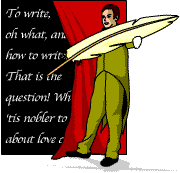Writing Right with Dmitri: Where Do You Get Your Ideas?
Created | Updated Mar 3, 2013
Words, words, words. That's what we're made of. Herewith some of my thoughts on what we're doing with them.
Writing Right with Dmitri: Where Do You Get Your Ideas?

Ah, the dreaded question: 'Where do you get your ideas?'
If you tend to answer mysteriously, 'That would be telling,' that's fine. But if in reality you're waiting to dream the next storyline, you may be placing too great a burden on your subconscious. Give it something to work with.
Where you get ideas can vary according to what you're about to write. Suppose you wanted to make up a story about dog trainers. You could just turn on the TV to the Animal Planet channel, or go searching on Youtubes under 'Westminster Kennel Club Show'. In addition to picking up tips for what your characters could do, you'd have the extra added advantage of getting to go 'aww' every time that little Affenpinscher who won best in show did something extra cute.
Suppose you want to say something original in your journal or blog. Nothing works better than timely, and you're sitting at the computer, anyway. If you're like me, the news intrudes on your concentration whenever you switch email accounts. Well, okay, not really the news – for that you have to pay attention. The 'news'. You know what I mean. The other day, I had to be told the Pope was retiring, but I'd already seen several pieces about odd lawsuits and strange coincidences. Follow some of them up. You never know what you might find out. Sometimes the ridiculous stirs your imagination – let it run riot and see what you come up with. Share the juicy titbits in your own way.

Looking for a new subject for a Guide Entry? You can always try trolling the Edited Guide, to see what's already in there. You'll get lost in there, promise. Look up a subject that interests you. Try to find an angle or detail that's been overlooked. Add your two cents. Set yourself a challenge: 'Can I find one more thing to say about the Isle of Wight?'
Close the computer. Go for a walk, if the snow's melted or the drive's been shoveled. Clear your mind. Let the rhythm of your feet form a backbeat to your thoughts. See what comes to the surface. It's better than waiting till you fall asleep.
If you're around clever people, or even not-so-clever people who like to talk a lot, pay attention to what they're saying – and the way they say it. You might get an idea or two. Here's an example: back in the 1950s, Andy Griffith, a young college graduate from North Carolina, was looking to break into acting. To begin with, he needed to write himself some material.
According to an interview he gave many years later, Griffith turned to a friend – a graduate student in English literature. 'Tell me the plot of a Shakespeare play,' he demanded. He listened, and took notes. Then he wrote himself a monologue, about a person from the North Carolina mountains experiencing Romeo and Juliet for the first time. It sounded like this. He and his wife toured around the southern US. She sang, he told stories like that. He told another one about football that was even more popular. On the strength of this work, he became a famous actor on Broadway, in Hollywood, and on television. But it started with curiosity and listening.
Where do you get your ideas? If you've got some sources to share, we'd love to hear from you.
But when you're watching TV, or jawing with your neighbour, or closing your eyes for a nap, don't let people tell you you're not working.
Just say, 'I'm doing research.'
Writing Right with Dmitri Archive
